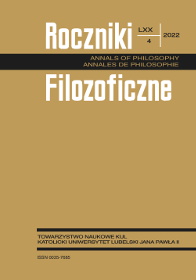PASSIVE TOLERANCE VERSUS POLITICAL ENGAGEMENT. ANTISTIUS CONSTANS, KOERBAGH, VAN DEN ENDEN, AND SPINOZA
PASSIVE TOLERANCE VERSUS POLITICAL ENGAGEMENT. ANTISTIUS CONSTANS, KOERBAGH, VAN DEN ENDEN, AND SPINOZA
Author(s): SONJA LAVAERTSubject(s): Social Philosophy, History of ideas, Political history, Social history, Early Modern Philosophy, 17th Century
Published by: Towarzystwo Naukowe KUL & Katolicki Uniwersytet Lubelski Jana Pawła II
Keywords: Spinoza; Koerbagh; Van den Enden; Antistius Constans; Radical Enlightenment; freedom of thought and speech;
Summary/Abstract: This article investigates the contribution of Spinoza and authors of his circle (Antistius Constans, Van den Enden and Koerbagh) on the modern conception of tolerance. In his Tractatus theologico-politicus (1670), Spinoza launches the libertas philosophandi-question integrating two kinds of freedom between which there is a tension: freedom of thought and speech and freedom of religious conscience. As freedom means living and acting in society in light of one’s own interests, tolerance becomes a political issue that depends from political perspectives and priorities. This insight leads Spinoza to bringing together the control of political authority on religious affairs and a political regime of religious plurality and toleration. These ideas seem to be reminiscent of texts published in his immediate circle: the anonymus De jure ecclesiasticorum (1665); the political pamphlets Kort verhael (1662) and Vrye Politijke Stellingen (1665) of his teacher Van den Enden; the subversive dictionary Een Bloemhof (1668) and the systematic philosophical Een Ligt (1668) of Koerbagh. In these texts the question of religion and religious authority shifts to the question of the nature and origin of political authority. The authors all criticize the abuse of power in light of the idea that there is no freedom without equality and no equality without freedom. Together with Spinoza’s Tractatus politicus (1677), they thereby form an anomaly within the anomaly of the Calvinist Low Countries that regards specifically this radical democratic view. They are not so much talking about tolerance but about everyone’s active participation in political life which is necessary for the rescue of the republic.
Journal: Roczniki Filozoficzne
- Issue Year: 70/2022
- Issue No: 4
- Page Range: 297-317
- Page Count: 21
- Language: English

